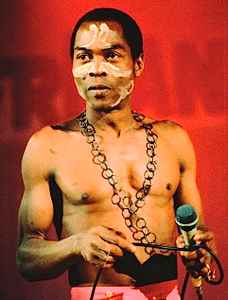121. No Agreement: Fela Kuti and Wole Soyinka
The political and musical revolution of Fela Kuti’s Afrobeat, the social critique of his cousin, the playwright Wole Soyinka, and the extraordinary career of Fela's mother Funmilayo.
Themes:
• B. Dauda and T. Falola, Wole Soyinka: Literature, Activism, and African Transformation (New York: 2022).
• J. Gibbs, Critical Perspectives on Wole Soyinka (Washington DC: 1980).
• C. Johnson-Odim, N.E. Mba, For Women and the Nation: Funmilayo Ransome-Kuti of Nigeria (Urbana: 1997).
• E.D. Jones, The Writing of Wole Soyinka (London: 1988)
• G. Moore, Wole Soyinka (London: 1978).
• T. Olaniyan, Arrest the Music! Fela and his Rebel Art and Politics (Bloomington: 2004).
• M.E. Veal, Fela: the Life and Times of an African Musical Icon (Philadelphia: 2000).
• D. Wright, Wole Soyinka Revisited (New York: 1993).






Comments
Length of Series
Hey Peter! I just wanted to ask if you know how many more episodes you have in this series? After all, the third leg of the African series has gone on as long as the entire Indian series! Of course, there’s lots to cover, but I’m wondering when the Chinese Philosophy episodes will begin?
In reply to Length of Series by Josh
When will China start?
It's a bit in flux but it looks like China will start around the turn of 2023 to 2024.
I'm also looking forward to…
I'm also looking forward to China.. I guess approximately 10-12 episodes of africana "philosophy" is left, which makes 5-6 months..
Fela Kuti quote
Of all the things that have been said in favour of the claim that there are a people and a body of thought that can be called Africana, the anecdote about Fela Kuti saying that Malcolm X retaught him how to be an African, I found the most persausive. For whatever that says about me.
It was also gratifying that Kuti spoke glowingly about his mentor, a woman, Sandra Smith Isadore. In a lot of the episodes you've acknowledged the sexism of a good few of the black men in the series. Kuti seems to be different in that respect. Though I don't want to make too much of this. In a short video I watched on his life, it said that in 1978 he married 27 women. According to wikipedia he did that to avoid accusations from the police that he had kinapped them. However, wikipedia also said, "Later, he adopted a rotation system of maintaining 12 simultaneous wives", which made me laugh, (for whatever that says about me), but doesn't obviously make him a paragon of equality.
This is the internet, and when it comes to the internet I try to follow the Royal Society and their motto: Nullius in verba. Take nobody's word for it. I found a reference to the Kuti quote here:
https://afrobeat-music.blogspot.com/2011/03/fela-kutis-mentor-sandra-smith-isadore.html
They cite it as from a book "Fela: The Life and Times of a Musical Icon" by Micheal Veal. Which is in your references. But that was published in 2000, after Kuti died in 1997. So I don't think it will be the primary source for that quote. It reads as though it came from an interview recorded for TV or radio.
Can you point me in the direction of the primary source for this quote? If you have access to the Michael Veal book, I would guess it says in there where he got it from. The quote in full:
“This book, I couldn’t put it down: The Autobiography of Malcolm X….This man was talking about the history of Africa, talking about the white man….I never read a book like that before in my life…..I said, ‘This man is a man!’ I wanted to be like Malcolm X….I was so unhappy that this man was killed. Everything about Africa started coming back to me.”
Thanks for the podcasts.
Add new comment